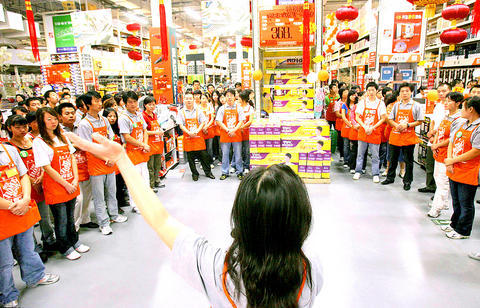Home-improvement supplies retailer Home Depot Inc has tentatively agreed to sell its wholesale distribution division to a group of private equity firms for US$1.8 billion less than originally planned and will retain a small stake in the unit, a person with direct knowledge of the sale said.
The deal, which also includes Home Depot guaranteeing US$1 billion of the debt the buyers will take on to complete the transaction, was hammered out during several days of talks that continued into the weekend, the person said on Sunday.
The person, who asked not to be identified because he was not authorized to speak publicly, said the revised agreement calls for Home Depot to receive US$8.5 billion in cash instead of the original US$10.3 billion agreed upon in June.

PHOTO: AFP
Home Depot will retain a 12.5 percent stake in the HD Supply unit, the person said.
Even though Home Depot is accepting less than anticipated for the unit, the deal is expected to allow it to proceed with its plan to buy back up to US$22.5 billion in company shares.
A Home Depot spokeswoman declined to comment.
The world's largest home improvement store chain had hinted previously that the deal could fall through or that the price would have to be reduced.
Atlanta-based Home Depot had said publicly the deal was not contingent on financing, but there were scenarios under which a party could walk away.
According to a regulatory filing, the agreement could have been terminated at any time prior to the completion of the sale by mutual consent.
When the deal was first announced, Home Depot said it would sell the unit for US$10.3 billion to a group of private equity firms.
But since then, as financial markets have faced turmoil, Home Depot had said it was talking with the buyers about restructuring the agreement, which it said could result in a lower price tag.
The talks were supposed to wrap up on Thursday, but continued for several more days.
Home Depot operates 2,200 stores in the US, Canada, Mexico and China.

WAITING GAME: The US has so far only offered a ‘best rate tariff,’ which officials assume is about 15 percent, the same as Japan, a person familiar with the matter said Taiwan and the US have completed “technical consultations” regarding tariffs and a finalized rate is expected to be released soon, Executive Yuan spokeswoman Michelle Lee (李慧芝) told a news conference yesterday, as a 90-day pause on US President Donald Trump’s “reciprocal” tariffs is set to expire today. The two countries have reached a “certain degree of consensus” on issues such as tariffs, nontariff trade barriers, trade facilitation, supply chain resilience and economic security, Lee said. They also discussed opportunities for cooperation, investment and procurement, she said. A joint statement is still being negotiated and would be released once the US government has made

Authorities have detained three former Taiwan Semiconductor Manufacturing Co (TMSC, 台積電) employees on suspicion of compromising classified technology used in making 2-nanometer chips, the Taiwan High Prosecutors’ Office said yesterday. Prosecutors are holding a former TSMC engineer surnamed Chen (陳) and two recently sacked TSMC engineers, including one person surnamed Wu (吳) in detention with restricted communication, following an investigation launched on July 25, a statement said. The announcement came a day after Nikkei Asia reported on the technology theft in an exclusive story, saying TSMC had fired two workers for contravening data rules on advanced chipmaking technology. Two-nanometer wafers are the most

NEW GEAR: On top of the new Tien Kung IV air defense missiles, the military is expected to place orders for a new combat vehicle next year for delivery in 2028 Mass production of Tien Kung IV (Sky Bow IV) missiles is expected to start next year, with plans to order 122 pods, the Ministry of National Defense’s (MND) latest list of regulated military material showed. The document said that the armed forces would obtain 46 pods of the air defense missiles next year and 76 pods the year after that. The Tien Kung IV is designed to intercept cruise missiles and ballistic missiles to an altitude of 70km, compared with the 60km maximum altitude achieved by the Missile Segment Enhancement variant of PAC-3 systems. A defense source said yesterday that the number of

Taiwanese exports to the US are to be subject to a 20 percent tariff starting on Thursday next week, according to an executive order signed by US President Donald Trump yesterday. The 20 percent levy was the same as the tariffs imposed on Vietnam, Sri Lanka and Bangladesh by Trump. It was higher than the tariffs imposed on Japan, South Korea and the EU (15 percent), as well as those on the Philippines (19 percent). A Taiwan official with knowledge of the matter said it is a "phased" tariff rate, and negotiations would continue. "Once negotiations conclude, Taiwan will obtain a better